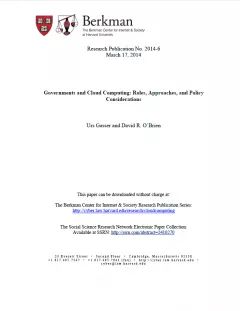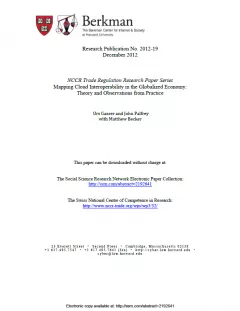Cloud Computing
Since 2010, the Berkman Center has engaged in research and activities focused on understanding emerging issues and trends related to cloud computing. Led by Executive Director and Harvard Law School Professor of Practice, Urs Gasser, this initiative seeks to identify and evaluate the challenges and opportunities associated with cloud computing, with a particular focus on the technological, social, legal, and market contexts that shape it.
The early phases of the initiative were exploratory. With generous support from Microsoft and in collaboration with the Swiss National Center of Competence in Research (NCCR) Trade Regulation project on digital technologies and trade governance at the University of Berne, the Berkman Center convened private sector stakeholders, experts, government representatives and others in a series of workshops and small events to catalog and discuss the most pressing domestic and international issues facing cloud computing in topics such as data retention, security practices, regulation and governance, and privacy. The initiative also drew on and contributed to the Berkman Center’s work, also led by Professor Gasser and Berkman Center director John Palfrey, on interoperability, which used as cloud computing as a lens for analyzing benefits and risks in the broadly-framed contexts of legal, technical, organizational, and global interoperability. The efforts from this stage are featured in a series of publications, including a research paper on governance, a case study and in-depth article on interoperability and cloud computing, and the focus of chapter 13 in John Palfrey and Urs Gasser, Interop: The Promise and Perils of Highly Interconnected Systems (New York: Basic Books, 2012).
The next phases of the project focused on global perspectives of cloud computing and an international working group was gathered to collaborate with the Berkman Center team. Collaborators from from Keio University in Japan, the Research Center for Information Law at the St. Gallen University in Switzerland, the NEXA Center for Internet & Society in Italy, and others added a comparative analytical perspective in a second round of events, conversations, and a workshop on global cloud issues and related government action. Much of the focus of the working group centered on exploring government approaches to cloud infrastructure and models for multi-stakeholder efforts driven by governments and private sector actors. Other key topical issues included: jurisdictional issues, dispute resolution systems, and risk analysis on the international level. Building upon the many inputs, written publications, conversations, case studies, and other materials gained from the working group and our earlier workshops, the Berkman Center cloud team worked towards mapping the interactions between governments, the private sector, and cloud computing. The outputs of these efforts are featured in a series of publications, including an in-depth study on the approaches used by governments around the world in responding to the emergence of cloud computing and a paper on the interplay between cloud innovation and the law. The work in this phase also contributed to our collaboration with the Swiss NCCR Trade Regulation project on digital technologies and trade governance at the University of Berne.
As of 2013, the Berkman Center continues to analyze the impact of cloud computing in its Student Privacy Initiative, which explores the dimensions of emerging cloud-based technologies in educational settings. More information about this project can be found here on our website.




